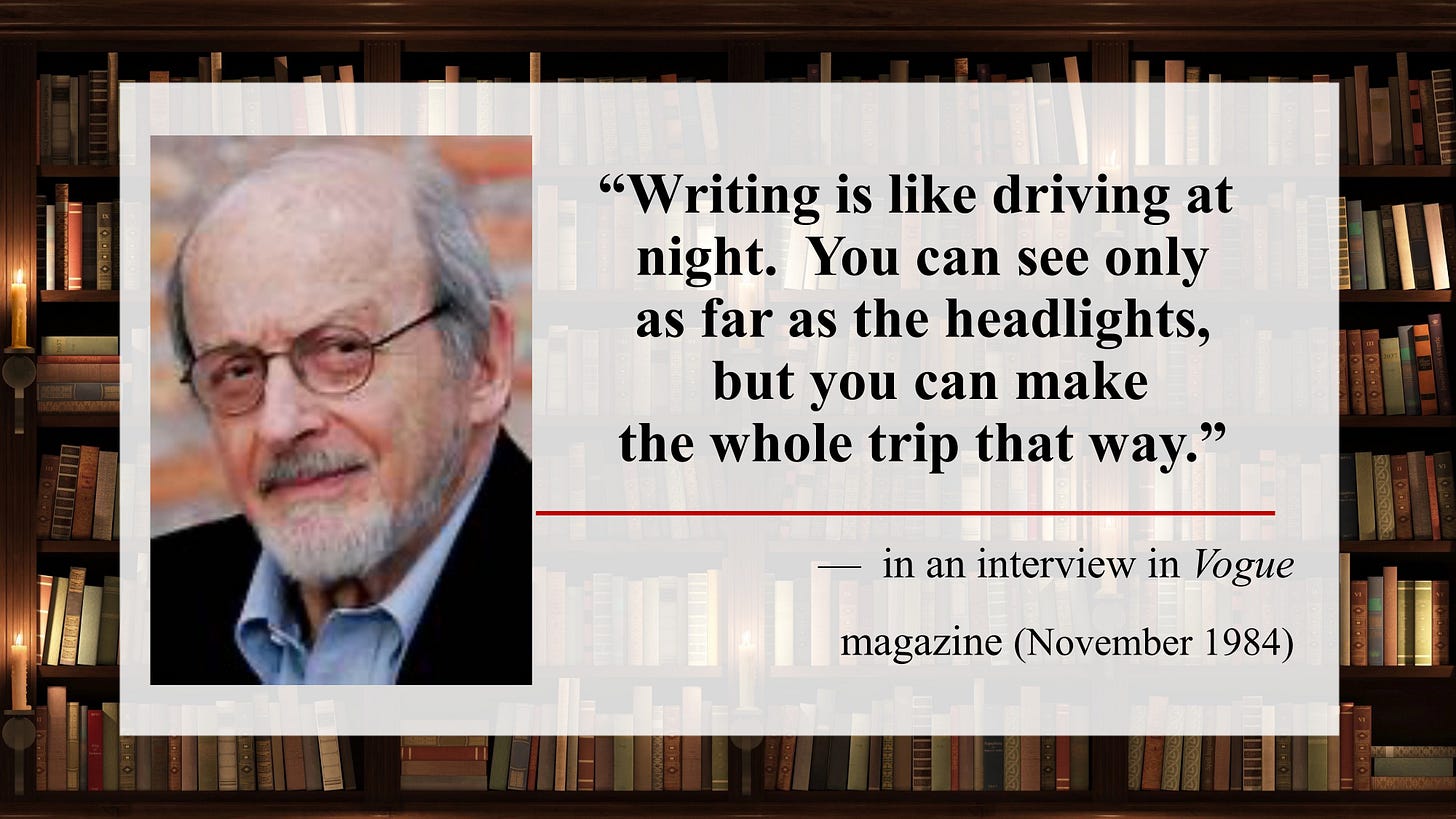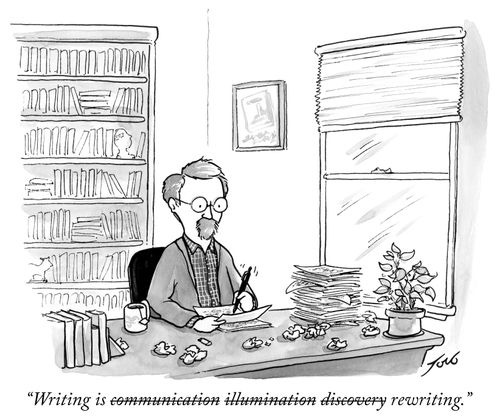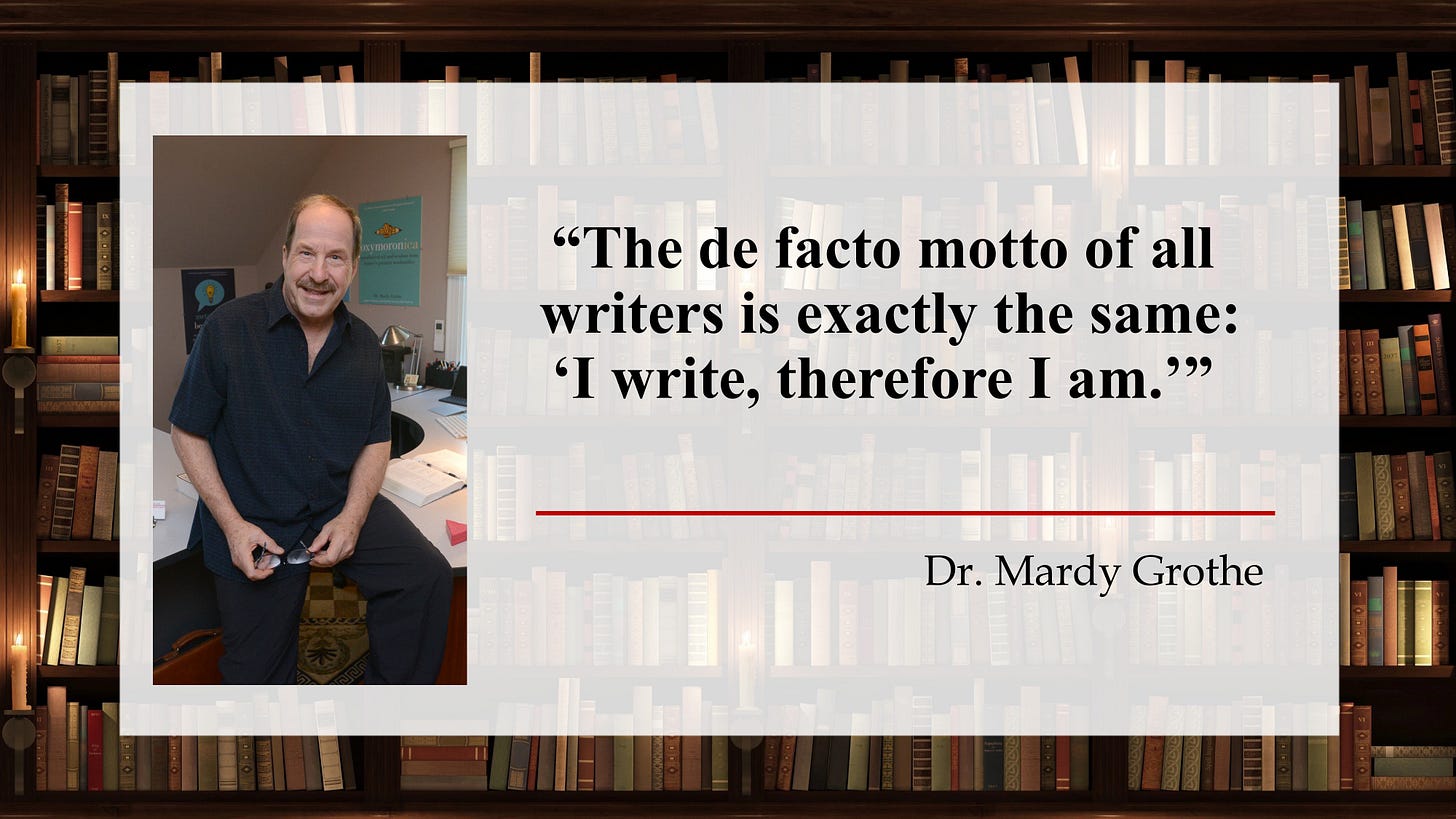Dr. Mardy's Quotes of the Week ("The Best Thing Ever Said on Writing")
Jan. 5—11, 2025 | THIS WEEK'S THEME: “The Best Thing Ever Said on Writing"
Great Opening Line of the Week
While this is not exactly a sizzling opening paragraph, I’ve chosen it because it marks the first appearance in print of a powerful idea: good writing is clear thinking made visible.
In the book—one of the earliest American books devoted exclusively to helping writers write better—Bierce continued on the subject of precision in writing:
“It is attained by choice of the word that accurately and adequately expresses what the writer has in mind, and by exclusion of that which either denotes or connotes something else.”
For well over 2,000 memorable opening lines from every genre of world literature, go to www.GreatOpeningLines.com.
This Week’s Puzzler
On January 6, 1931, this man was born in New York City, the only child of second-generation Americans of Russian-Jewish extraction. His father, a music school owner and avid reader, named him after Edgar Allan Poe—and it was no big surprise that the young boy learned to read at a very early age. He was also a math prodigy, which ultimately resulted in his admittance to the Bronx High School of Science. Once in high school, though, his interests slowly shifted from the mathematical to the literary—and he spent most of his time working on the school literary magazine.
He attended Kenyon College (Ohio), where he majored in philosophy, performed in theatrical productions, and studied poetry. After graduating with honors in 1952, he did graduate work for a year at Columbia University before being drafted. After his military service, he worked briefly for film and TV production companies before taking a job as an editor in 1960. His editing skills were so impressive that, by the end of the decade, he was working with such big-name authors as James Baldwin, Ian Fleming, Norman Mailer, and Ayn Rand.
Once he began to concentrate on his own writing efforts, he experienced immediate success. In 1971, he won The National Book Award for his debut novel, The Book of Daniel, a fictionalized account of the Julius and Ethel Rosenberg trial. Four years later, his novel Ragtime became a New York Times bestseller. It was made into a popular film in 1981, and in 1998 further adapted into a Broadway musical (at the end of the century, the Modern Library named it one of the 100 best novels of the century). Over the next
several decades, he continued to produce powerful works of fiction, including the Pulitzer Prize-winning Billy Bathgate (1989). In 2015, at age 84, he died of complications related to lung cancer.
While this week’s Mystery Man is remembered principally for his fiction, he wrote and talked frequently about the process of writing. Of the many observations that have been made on the subject, some of my personal favorites come from him, including:
“Writing is a socially acceptable form of schizophrenia.”
But my absolute favorite is:
Who is this person? (Answer below)
What Is The Single Best Thing Ever Said on the Subject of Writing?
I’ve written ten books in my lifetime—and thousands of short essays—so I guess it’s appropriate to call me a writer. I rarely describe myself that way, though, because it doesn’t capture what truly drives me. You see, I view myself as simply an avid reader and a lifelong learner who enjoys sharing what he’s learned with others. It’s not the process of writing I love, it’s discovering something new and then telling others about it. For me, reading and researching is like panning for gold and writing is like sharing the nuggets.
The quotation in this week’s Puzzler is an attempt to describe the process of writing. And while a gazillion observations on writing have been made over the centuries, I regard this one as The Single Best Thing Ever Said on the subject.
Is it possible to identify the single best thing ever said on a given topic? The notion may seem audacious—or even preposterous—at first, but it’s not as far-fetched as you might think. I shared the backstory on this subject a few years back, but for new subscribers, let me briefly review it.
The idea first occurred to me almost thirty years ago, when I was traveling around the country speaking to CEOs on the topic of leaders and leadership. Over the years, I learned that most people love to have powerful ideas illuminated by memorable quotations, so I liberally sprinkled my talks with thoughts on leadership from some of history’s most famous figures. One of the most well-received was:
In offering this observation, I routinely described it as “one of the best things ever said on the subject of leadership.” And when I did, most people nodded in agreement. Many even proceeded to jot it down.
In those seminars, I didn’t restrict myself to leadership quotations, and included many observations that stimulated thoughtful self-reflection. For example, after sharing William Wordsworth’s legendary observation that “The child is father of the man,” I often asked people to pause and reflect on how events in their childhood influenced the way they were functioning as adults.
Delving deeper into the subject of early influences, I stated my belief that almost all families have been affected by the problem of alcoholism. And then, I offered what I described as one of the best things ever said on the subject:
Almost every time I offered this quotation, someone would say, “Pardon me, could you repeat that; I’d like to write it down.” While the inquiring person was jotting down the repeated quotation, I often noticed other people doing the same thing. And every now and then, someone would say, “I have something I’d like to say on the subject”—and then go on to share an emotionally moving story that would moisten the eyes of nearly everyone in the room.
The two quotations above were so popular that I included them in all of my presentations. After mentioning them in a talk in the late 1990s, a voice from the back of the room blurted out, “So, what is the best thing ever said on the subject of committees?”
I’d never formally applied the best thing designation to “committee” quotations, so I was momentarily taken aback. After hemming and hawing for a few moments, I conceded that I couldn’t think of one. But then, in one of my most memorable “on stage recoveries,” I found myself saying, “Hold it! Now that I think about it, there might be one,” and I recalled a quotation I’d recently discovered in my research:
After I dredged up the quotation, the room erupted in spontaneous applause. The guy in back who asked the question said with a big smile on his face, “Perhaps you should consider writing a book on The Single Best Thing Ever Said on Just About Any Topic You Can Think Of.” And that was how the whole idea was born.
Sadly, the book never got written, but I currently have over 300 entries in a computer file that I’ve given the acronym TSBTES. Speaking frankly, a book on the subject will likely never be published. But I still haven’t ruled out the idea of one day launching a website devoted to the whole idea. In fact, I already own the rights to two relevant domain names: www.TheSingleBestThingEverSaid.com and www.TSBTES.com. Launching a new commercial-free website is an expensive and time-consuming process, but I may do it if I’m able to attract a sufficient number of Founding Sponsors. Time will tell.
What I do know for sure is this: when a quotation is introduced as the single best thing ever said on a subject, the looks on people’s faces are fascinating. In most cases, there is clearly a heightened level of interest or curiosity. Some people appear skeptical—and sometimes, very skeptical—and in a nod to the skeptics, I usually add, “If you ever come across a better observation on the subject, let me know.”
Now the ball is in your court. If you agree that this week’s Puzzler quotation is the single best thing ever said about writing, let me know. If you don’t, please share the one you do regard as best in the “Comments” section below. If you have a fondness for concise or pithy observations, perhaps you’ll find your favorite among these:
Writing to me is simply thinking through my fingers. — Isaac Asimov
It is easy to write a check if you have enough money in the bank, and writing comes more easily if you have something to say. — Sholem Asch
The very first thing I tell my new students on the first day of a workshop is that good writing is about telling the truth. — Anne Lamott
Writing books is the closest men ever come to childbearing. — Norman Mailer
True ease in writing comes from art, not chance,/As those move easiest who have learned to dance. — Alexander Pope
Writing a column is easy. You just sit at your typewriter until little drops of blood appear on your forehead. — Walter “Red” Smith
Talent is helpful in writing, but guts are absolutely necessary. — Jessamyn West
Or perhaps you have a fondness for more expansive quotations—like these:
Writing is like hunting. There are brutally cold afternoons with nothing in sight, only the wind and your breaking heart. Then the moment when you bag something big. The entire process is beyond intoxicating. — Kate Braverman
Writing a book is an adventure. To begin with it is a toy, then an amusement. Then it becomes a mistress, and then it becomes a master, and then it becomes a tyrant and, in the last stage, just as you are about to be reconciled to your servitude, you kill the monster and fling him to the public. — Winston Churchill
When you write, you lay out a line of words. The line of words is a miner’s pick, a woodcarver’s gouge, a surgeon’s probe. You wield it, and it digs a path you follow. Soon you find yourself deep in new territory. Is it a dead end, or have you located the real subject? You will know tomorrow, or this time next year. You make the path boldly and follow it fearfully. You go where the path leads. — Annie Dillard
Writing is not an amusing occupation. It is a combination of ditch-digging, mountain-climbing, treadmill and childbirth. Writing may be interesting, absorbing, exhilarating, racking, relieving. But amusing? Never! — Edna Ferber
Writing isn’t about making money, getting famous, getting dates, getting laid, or making friends. In the end it's about enriching the lives of those who will read your work, and enriching your own life, as well. It's about getting up, getting well, and getting over. Getting happy, okay? — Stephen King
Writing is, for most, laborious and slow. The mind travels faster than the pen; consequently, writing becomes a question of learning to make occasional wing shots, bringing down the bird of thought as it flashes by. — E. B. White
Writing is not like painting where you add. It is not what you put on the canvas that the reader sees. Writing is more like a sculpture where you remove, you eliminate in order to make the work visible. Even those pages you remove somehow remain. — Elie Wiesel
If you’re a writer or aspiring writer, you might also want to craft an original observation on the theme. Who knows? Your creation might even go on to achieve a posterity of sorts if I decide to include in my my Dr. Mardy’s Dictionary of Metaphorical Quotations (DMDMQ). If you’re not a writer, but have a friend or family member who is, you might also ask them to join in the fun.
As always, for source information on the quotations above, and many more observations on the theme of WRITING, go here.
Cartoon of the Week:
Answer to This Week’s Puzzler:
E. L. Doctorow (1931-2015)
Dr. Mardy’s Observation of the Week:
Thanks for joining me this week. See you next Sunday, when the theme will be “INSPIRATION.”
Mardy Grothe
Websites: www.drmardy.com and www.GreatOpeningLines.com
Regarding My Lifelong Love of Quotations: A Personal Note











It is easy to write a check if you have enough money in the bank, and writing comes more easily if you have something to say. — Sholem Asch”
Writing is even easier if you have Venmo!
We all should aspire to your notion of viewing ourselves as simply avid readers and a lifelong learners who enjoy sharing what we've learned with others.